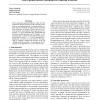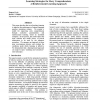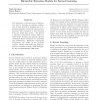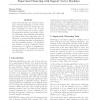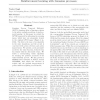120
Voted
ICML
2005
IEEE
16 years 3 months ago
2005
IEEE
Unsupervised learning methods often involve summarizing the data using a small number of parameters. In certain domains, only a small subset of the available data is relevant for ...
111
Voted
ICML
2005
IEEE
16 years 3 months ago
2005
IEEE
When monitoring spatial phenomena, which are often modeled as Gaussian Processes (GPs), choosing sensor locations is a fundamental task. A common strategy is to place sensors at t...
122
Voted
ICML
2005
IEEE
16 years 3 months ago
2005
IEEE
This paper describes the use of machine learning to improve the performance of natural language question answering systems. We present a model for improving story comprehension th...
118
Voted
ICML
2005
IEEE
16 years 3 months ago
2005
IEEE
Online feature selection (OFS) provides an efficient way to sort through a large space of features, particularly in a scenario where the feature space is large and features take a...
106
Voted
ICML
2005
IEEE
16 years 3 months ago
2005
IEEE
The integration of diverse forms of informative data by learning an optimal combination of base kernels in classification or regression problems can provide enhanced performance w...
103
Voted
ICML
2005
IEEE
16 years 3 months ago
2005
IEEE
This paper studies the aggregation of predictions made by tree-based models for several perturbed versions of the attribute vector of a test case. A closed-form approximation of t...
61
Voted
ICML
2005
IEEE
16 years 3 months ago
2005
IEEE
We propose a new kernel function for attributed molecular graphs, which is based on the idea of computing an optimal assignment from the atoms of one molecule to those of another ...
96
Voted
ICML
2005
IEEE
16 years 3 months ago
2005
IEEE
Supervised clustering is the problem of training a clustering algorithm to produce desirable clusterings: given sets of items and complete clusterings over these sets, we learn ho...
103
Voted
ICML
2005
IEEE
16 years 3 months ago
2005
IEEE
Properties of ensemble classification can be studied using the framework of Monte Carlo stochastic algorithms. Within this framework it is also possible to define a new ensemble c...
126
Voted
ICML
2005
IEEE
16 years 3 months ago
2005
IEEE
Gaussian Process Temporal Difference (GPTD) learning offers a Bayesian solution to the policy evaluation problem of reinforcement learning. In this paper we extend the GPTD framew...

